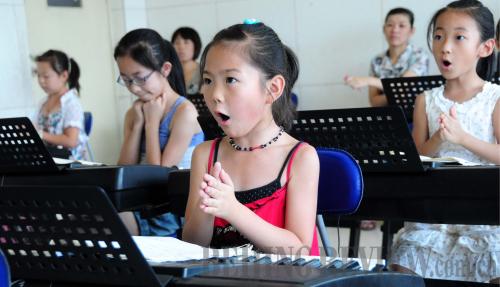|
 |
|
AWED BY MUSIC: Children learning to play the piano at a music class in Xingtai, Hebei Province (CFP) |
Located along the West Third Ring Road of Beijing, the piano school of the Jiang Jie Culture and Arts School, one of the most popular music schools for children in the city, has never been short of students. With more than 100 small piano teaching rooms in six storeys, it is one of the largest piano training schools in the city. The success of this particular school is not an isolated story, as it is just one of the 15 branches of the 1980s-founded Jiang Jie School in the city.
Zhang Lianyi, a middle school student from Beijing Yuying School, has been studying the piano here for more than three years and just passed the grade six of the tests organized by the Central Conservatory of Music, a nationwide testing system with grades of increasing difficulty ranging from one to nine.
Zhang, 15, started to learn the piano at five but quit practicing for more than three years, since he thought "playing the piano is so boring." This continued until he was taken by his mother to a concert by piano player Li Yundi, who won the highest award at the 14th International Frederick Chopin Piano Competition in 2000.
"It is hard to say how moved I was by the concert. It is just amazing to me that the piano can be played in such a wonderful way, and the music is so beautiful and touching," Zhang said. He then went back to the piano with a strong interest in Chopin's music.
"For my age," said Zhang, "Johannes Brahms's music is quite conservative and hard to understand; Peter Ilyich Tchaikovsky's music is quite sad and makes me feel sad as well; Franz Liszt's music is wild and crazy, and I am afraid that if I always play his music, I will die soon. Ludwig van Beethoven's struggle with fate is far from my life. So comparatively, Chopin's music is closer to me."
As a matter of fact, the music of Chopin is a must-play item for the grade eight test and above. Zhang of course won't stay at grade six. "Passing grades is not my goal now, as I get greater enjoyment from playing the piano than just passing the grades," said Zhang. "I practice the piano at least one-and-a-half hours every day, and I am confident that I can pass grade nine in the near future."
Compared with Zhang, Li Zhuoran reached a higher level of piano-playing ability at an earlier age. This 10-year-old boy had already passed grade eight in 2009.
"I was forced to play the piano at the very beginning," said Li, "and I knew nothing about the meaning of the music at all at that time." Talking about his story of piano playing, Li feels the process was smoother than that of Zhang's. "I didn't feel that bad about playing the piano, and I just kept playing and playing until I began to enjoy it."
Li's piano teacher, Dai Huanran, said part of her enjoyment in playing the piano comes from Chopin's music, and she likes to play the composer's pieces for her students.
"I don't think it is very effective to tell the kids the deep meaning of the music since they are too young to understand it," says Dai. "Besides, everybody has different interpretations of the same piece of music."
Dai just plays the music for her students and lets them express their feelings about the music. Some children connected the music to the composer's life story, which they learnt from books, and used the words such as "romantic" or "beautiful" to describe it. But Li said he thought the music is very "cartoonish," which is quite a fresh idea for Dai.
"I don't know how to express this clearly," said Li, "I just seem to see some cartoon characters running and smiling along the riverside and living happily together." This feeling increases Li's interest in playing piano, especially before he goes to bed each day. "This is because I hope I can dream about these cartoon images with the help of music," said Li.
Wu Jundong, a high school student in central China's Hunan Province, also has the habit of playing Chopin's music before going to sleep at night. He has lived in three countries and learnt to play piano as a small child. But he never took part in the piano-grading test.
"I think the piano should be played with the heart, not just the hands," said Wu, who regards it a good decision to include only a few of Chopin's items in the piano-grading test.
"For example, I could play Chopin's Fantaisie Impromptu at a very young age, but I always had different feelings about the music each time that I played it as I grew up. This is Chopin's music, you can never say you understand it totally," said Wu.
Wu said the music of Chopin helps him to calm down and think quietly each night, and he regards Chopin as more of a poet than a composer. "It is amazing that Chopin could maintain a calm heart amid bustling Paris in those days of creation. There was no orchestra, no opera in his life, just the piano," said Wu. "He must have felt lonely, but the piano would have been his best companion." | 